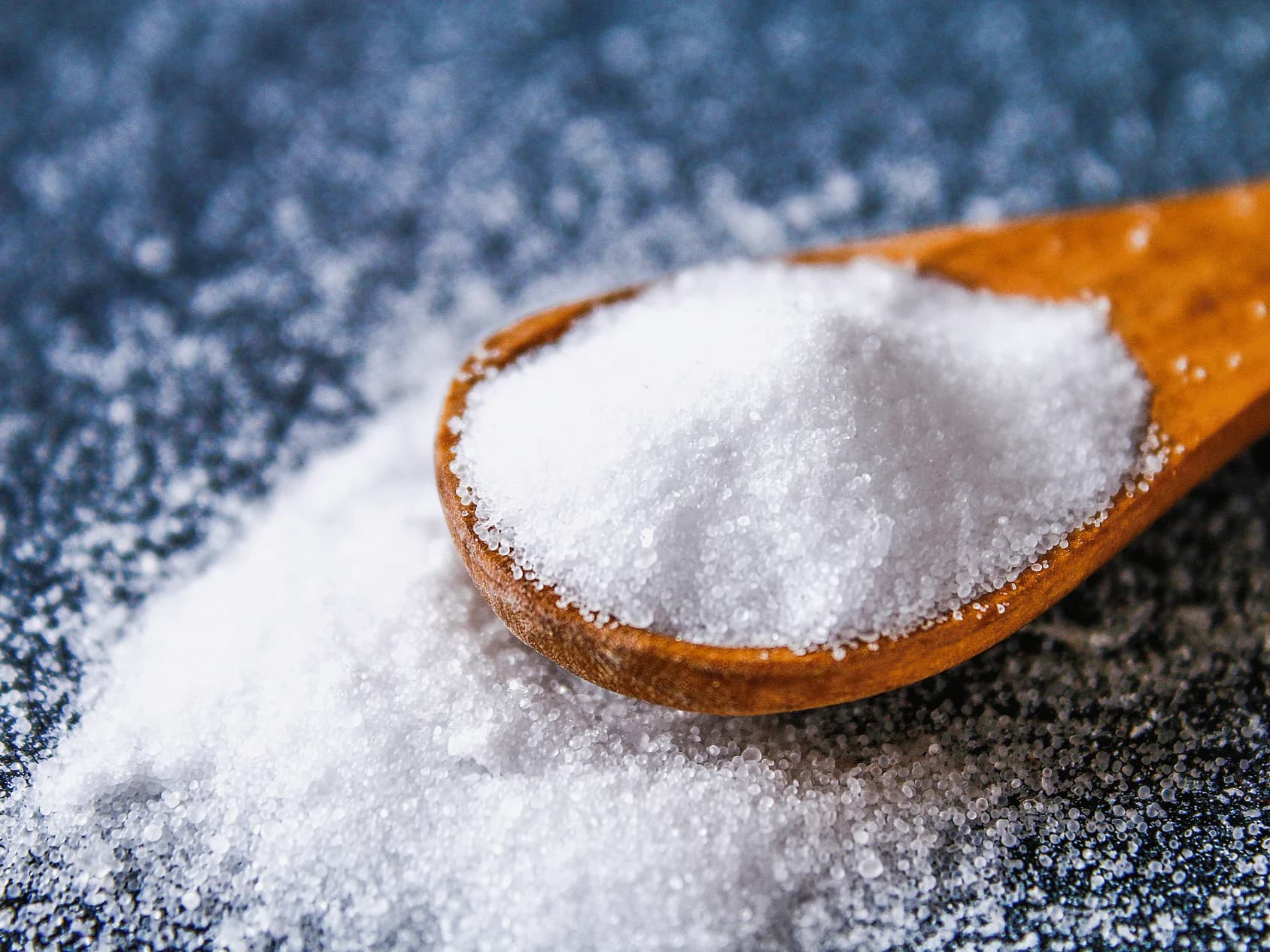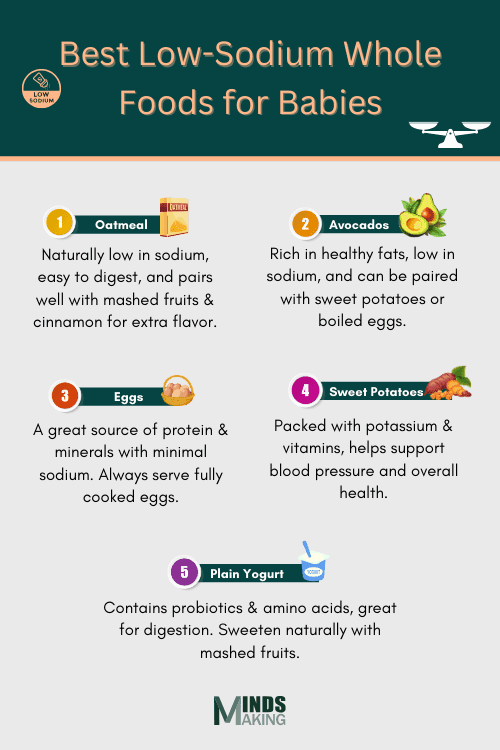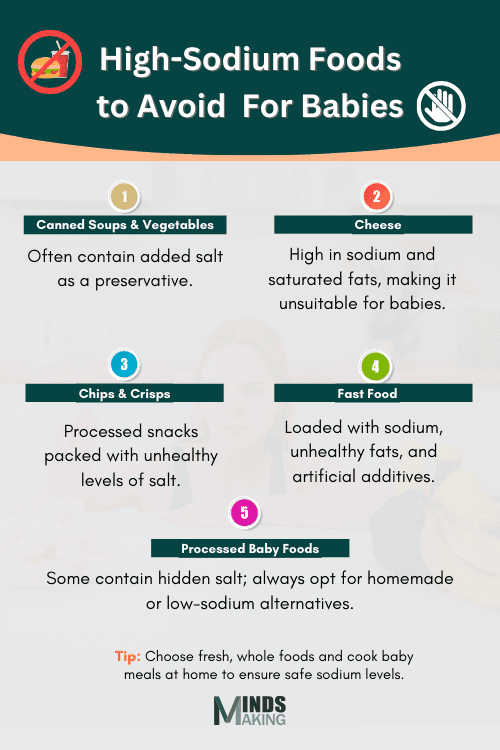Salt for Babies
Getty Images Pro

Written by Mindsmaking Medical Writer
Fact Checked by Mindsmaking Professionals
22nd, June, 2025
While sodium is essential for physiological functions in the body, salt for babies has been proven to cause dehydration, kidney strain, and high blood pressure in infants. Experts recommend a low-sodium baby diet for the first 12 months of their lives.
Sodium is an important mineral that is essential to our health as humans. It is significant for nerve function and maintaining proper hydration and fluid balance in the body.
However, as a parent, you may not know how much salt is okay for your little one. Many parents wonder if including salt for babies is a wise choice or if they should avoid it altogether, given that studies show risks of long-term health consequences tied to excessive salt intake in babies. (6)
This article will provide insights into the role of sodium in the body, the safe and recommended intake of salt for babies, and low-sodium baby diet options.
Key Takeaways
Sodium is important for human function but can be dangerous for babies when given at high levels.
Breast milk and formula contain natural sodium that is within the daily limit for infants, which is 0.4g.
Salt should not be included in the meals of Babies for the first year of their lives. After their first birthday, it can be introduced in small amounts of under 2g per day.
Excessive salt intake in babies can cause problems like dehydration, high blood pressure, lethargy and kidney issues.
The benefits of a low-sodium baby diet include hydration, good heart health, stable blood pressure, good kidney function and helping babies develop a preference for natural flavors.
Processed foods can contain hidden sodium. Foods like teething biscuits, chips and crackers. Checking food labels would help identify such high-sodium foods.
Parents should opt for low-sodium baby diets such as whole foods, fruits and vegetables in replacement of high-sodium diets like canned foods, salted biscuits and chips.
To replace salts, parents can use homemade baby food seasonings like cinnamon, basil, garlic, and onion powder for taste and added flavor.
What is Sodium?
Sodium is a mineral the body needs for basic physiological functions that control mobility and is found mostly in table salt, which contains 60% sodium and 40% salt (7). Sodium is naturally occurring in many foods we know and is commonly consumed as sodium chloride (Table salt). It is a great source of flavor, a binder, and a good option for preservation. (2)
While sodium is inherent in some foods, a large portion of consumed sodium comes from added salts to homemade foods and processed foods, where it is needed for flavor and preservation.
Aside from being a binder and a source of flavor and taste, sodium has great benefits to the body. The role of sodium in the body includes:
- Supporting nerve development and function.
- Maintaining blood pressure.
- Balancing and regulating fluids and minerals.
- Maintaining muscle function.
In spite of this, babies require less sodium intake than the average adult because their underdeveloped kidneys are not mature enough to process high sodium levels efficiently.(10)
The Dangers of Excess Salt Intake in Babies
Studies show that babies have lower sodium needs than regular adults because of their underdeveloped kidneys, which can’t process high levels of sodium (3). Because of this, Healthcare providers recommend that added sodium shouldn’t be included in the meals of babies under 12 months because breastmilk and formula contain natural levels of sodium that are safe and easily processed by your baby's kidneys.
If you must include salt in your baby's meals, there's a recommended daily sodium limit of under 2g for toddlers aged 1 year to 3 years, and under 1g for babies 0-12 months, which can be found naturally in Breastmilk, whole foods, and formula. (7)
By being mindful of your baby's salt intake, you are prioritizing their overall health because, despite the impeccable qualities and benefits of salt for babies, the impact of salt on their well-being can be deadly when consumed in quantities higher than 2g
Potential Dangers of High salt intake in babies include:
Kidney strain: Because the kidneys are still developing, excessive intake of salt for babies causes a strain on the kidneys because they cannot effectively process such high levels of sodium (3). This could lead to other issues like dehydration, hypernatremia, and High blood pressure in infants.
Dehydration: High sodium intake in babies causes an imbalance of fluids in the system, and this could lead to excessive thirst and dehydration in babies.
When babies consume high-sodium meals, their immature kidneys work harder to excrete the excess sodium, which in turn requires more water to dilute the sodium, potentially leading to a fluid deficit. (4)
High blood pressure: if babies are constantly being fed meals high in sodium, it could lead to the possibility of developing hypertension later in life.
Hypertension in babies can occur when the little kidneys struggle to process and pass out the excess sodium, leading to fluid retention and increased blood volume, which in turn raises the blood pressure. (5)
Hypernatremia:. Hypernatremia is the swelling of the hands and feet that can be caused by water retention in the body due to electrolyte problems as a result of a rise in sodium concentration.(4)
When babies consume high sodium meals, their bodies struggle to eliminate the surplus sodium and this can lead to fluid retention in the body that causes swelling on the hands and feet.
If you notice such signs of swelling on your baby, please take them to the emergency room.
Preference for salty foods: When babies are always fed meals high in sodium, they subsequently end up developing a preference for salty meals. Although studies show that this doesn't happen to a significant amount of children, it still occurs in some children. (10)
What is the recommended salt intake for babies?
Salt can be introduced to babies in small amounts from home-cooked meals after their first birthday. However, low-sodium baby diets should be used as alternatives before their first birthday. (3)
The World Health Organisation (WHO) gave the following daily recommended salt intake for babies:
- 0-6 months: 0.1g
- 6-12 months: 0.4g
- 1-3 years: 2g
Most of these sodium levels can be found in breast milk, baby formula, and even whole foods. Hence, it is advisable to watch out and not exceed your baby's daily limit.
Compared to adults with stronger kidney functions who can safely consume up to 6g of salt per day, babies have a limit of under 1g per day, and toddlers 2g per day. So the problem isn't the sodium but the amount contained in your baby's diet. It is advisable to keep it within the recommended limit.
Low-sodium baby diets: how to maintain a healthy Balance
Many processed foods contain hidden sodium at unsafe levels for your little one. Healthcare professionals advise parents to substitute for low-sodium baby diets that are nutritious and beneficial to babies. (10)
These low-sodium diets can be found in healthy whole grains, fruits, vegetables, and lean proteins.
Here are some simple low-sodium whole meals for babies:
Oatmeals: This whole food contains natural sodium levels that are safe and can be easily processed by your baby's kidney. You can include mashed fruits and a dash of cinnamon for extra goodness to spice it up and make it more tasty for your little one.
Avocados: This fruit contains healthy and unsaturated fats and is also low in sodium. A great low-sodium choice for a baby. It can be paired with sweet potatoes or boiled eggs.
Eggs: Eggs are low in sodium but rich in minerals, protein, and saturated fats (8). It is advised never to give babies undercooked eggs, so always make sure they are well cooked. (6)
Sweet Potatoes: This low-sodium meal is high in vitamins and minerals like Biotin and potassium. Great for maintaining blood pressure.(9)
Plain Yoghurt: This low-sodium diet is rich in probiotics and amino acids. You can include mashed or pureed fruits to sweeten it up and make it more tasty for your baby.
These foods can be paired alongside each other for added flavor and nutrients for your baby. You can try combos like:
- Mashed Banana and avocado (no added salt)
- Steamed carrot and sweet potatoes (naturally flavourful)
- Plain yoghurt and pureed fruits (sweet and savoury)
- Oatmeals and mashed fruits (naturally sweet)
- Homemade apple and pear puree (no additives)
The low-sodium diets include benefits like:
- Minimizing the risk of dehydration.
- Promoting healthy kidneys.
- Promoting heart health and reducing the risk of hypertension.
- Encouraging a preference and a curiosity to try natural flavours.
In place of salt for flavouring, there are some of the best salt alternatives for babies you can include in their meals. They include natural spices and homemade baby seasoning like basil, oregano, cinnamon, garlic, and onion powder.
Read This Next
No posts available
Mindsmaking

High sodium foods to Avoid in your Baby’s Diet
Processed foods usually contain high levels of sodium, which is unhealthy for babies. Before purchase, endeavor to check the labels for the amount of sodium included per gram. These foods include:
Canned Soups & Vegetables: These might seem like a quick and easy option, but they often contain a lot of added salt to enhance flavor and extend shelf life. Your baby’s tiny kidneys aren’t ready to handle that much sodium.
Cheese: While cheese is packed with calcium and protein, many types are surprisingly high in sodium. Too much can strain your baby’s kidneys and lead to unhealthy eating habits. If you want to include cheese, go for low-sodium varieties and offer it in small amounts.
Chips & Crisps: These crunchy snacks might be tempting, but they’re loaded with salt, unhealthy fats, and artificial additives that provide little to no nutrition.
Fast Food: Burgers, fries, and other takeout meals are packed with sodium, preservatives, and unhealthy fats that aren’t good for your little one.
Processed Baby Foods: Not all store-bought baby foods are created equal, some contain hidden sodium to improve taste and preservation. Always check the labels before buying and look for low-sodium options.
Mindsmaking

Frequently Asked Questions
Why can’t babies have salt?
Babies have immature and delicate kidneys that cannot process a large amount of salt efficiently, and this could lead to a plethora of health problems in the future, such as high blood pressure, kidney failure, and heart disease [6]. As a parent, it is best to opt for low-sodium alternatives like cinnamon, basil, lemon juice, garlic, and onion powder. These spices will add a sweet and savoury taste to your baby's meals until they are of age to have a certain amount of sodium in their diet.
What happens if your baby eats salty food?
When a baby consumes salty food, the baby could experience symptoms like increased thirst, a rise in blood pressure, and, in the worst-case scenarios, lethargy (weakness and dizziness), Kidney failure, and gastrointestinal issues like bloating, vomiting, Diarrhea or constipation [10]. If your baby shows warning signs like these, it's best to contact your paediatrician for an appointment or if in severe cases, call emergency services or go to the closest emergency room.
How do I know if my baby’s food has too much sodium?
Signs like swelling of the hands and feet, Hypernatremia, is a clear sign of high sodium levels in babies. If you notice such symptoms in your baby, it is advisable to discontinue your child's intake of salty foods and see a paediatrician for a health check-up.
What are the best first flavors to introduce to babies?
Instead of using salt in your baby’s meals, it is best to substitute for natural flavors like cinnamon, basil, lemon juice, garlic, or onion powder for added sweetness and tanginess to meals. These are rich in nutrients and easily digestible spices that are great for getting your baby started on developing a love for trying out a variety of meals. You can also substitute for whole meals like Mashed Banana and avocado, Steamed carrot and sweet potatoes, Plain yoghurt and pureed fruits, Oatmeals and mashed fruits, Homemade apple and pear puree. These healthy meals are naturally sweet and flavorful and contain no additives, providing the best nutrition your little one needs.
Can I give my baby a little bit of salt occasionally?
Healthcare providers like the NHS advise parents to avoid salt for babies in the first 12 months of their lives. Breast milk, formula and whole foods contain natural levels of sodium that are nutritious and digestible for their little organs [5]. It is best to avoid adding salt to meals for babies until after the first year and opt for low-sodium alternatives like whole foods and unprocessed foods. You can only introduce small amounts of salt in your little ones' meals; under 2g per day (800mg) from age 1-3 years.
Can babies' kidneys handle sodium in food?
Babies' kidneys are still a bit immature and can't process high levels of sodium. Formula and breast milk already contain natural sodium that is nutritious and immediately digestible [10]. So it is advised to limit the addition of salt for babies' meals and substitute for natural flavours like cinnamon, garlic and ginger powder or whole foods like avocados, fruit purees, mashed sweet potatoes and oatmeals. However, if your baby is above 1 year of age, you can stick to the recommended salt intake for babies that age, which is under 2g per day.
Is Himalayan pink salt or sea salt better for babies?
Although Himalayan pink salt and sea salt contain healthy minerals, they still contain the same approximate levels of sodium that are too high for babies under the age of 1 year [1]. It is best to avoid salt for babies if your child is under 12 months as their kidneys are delicate and can't process sodium or stick to the recommended salt intake for babies, which is 2g daily if your child is aged 1-3 years. You can introduce Himalayan pink salt or sea salt in small amounts to your baby’s meals after the first year of life.
At what age can babies start eating regular family meals with seasoning?
Healthcare Bodies recommend that babies can have salt included in their meals from the age of 1-3 years of age but in small amounts of 2g per day. So your toddlers can have meals with seasonings that are within the advised sodium limit [5]. However, if your baby is over 6 months of age and has begun weaning from Breastmilk or formula, you can incorporate natural seasonings and spices into their meals for added flavor.
How can I make homemade baby food flavorful without salt?
There are whole foods for babies that are naturally flavorful without the need for salt. Foods such as mashed avocados, eggs, Steamed carrots, sweet potatoes, Plain yoghurt, Oatmeals and fruits. However, if you want to make your baby's food more flavorful without salt, you can include natural spices and flavours like cinnamon, mashed or pureed fruits, garlic and onion powder, as they are some of the best salt alternatives for babies.
Was this article helpful?
How many stars are you giving this article?
Leave a comment
Your email address will not be published.